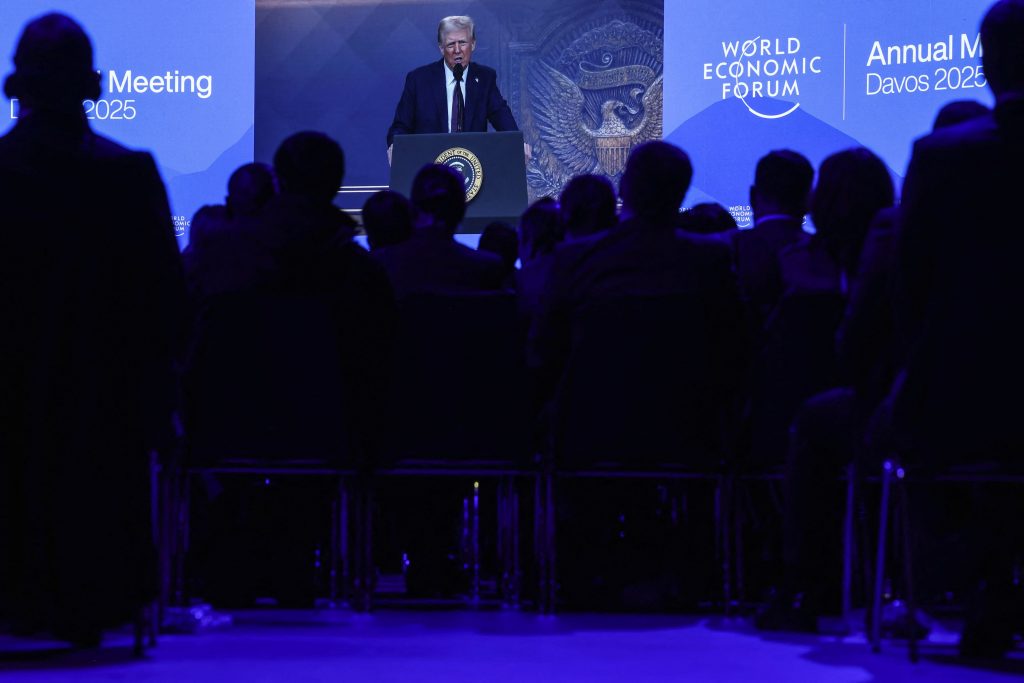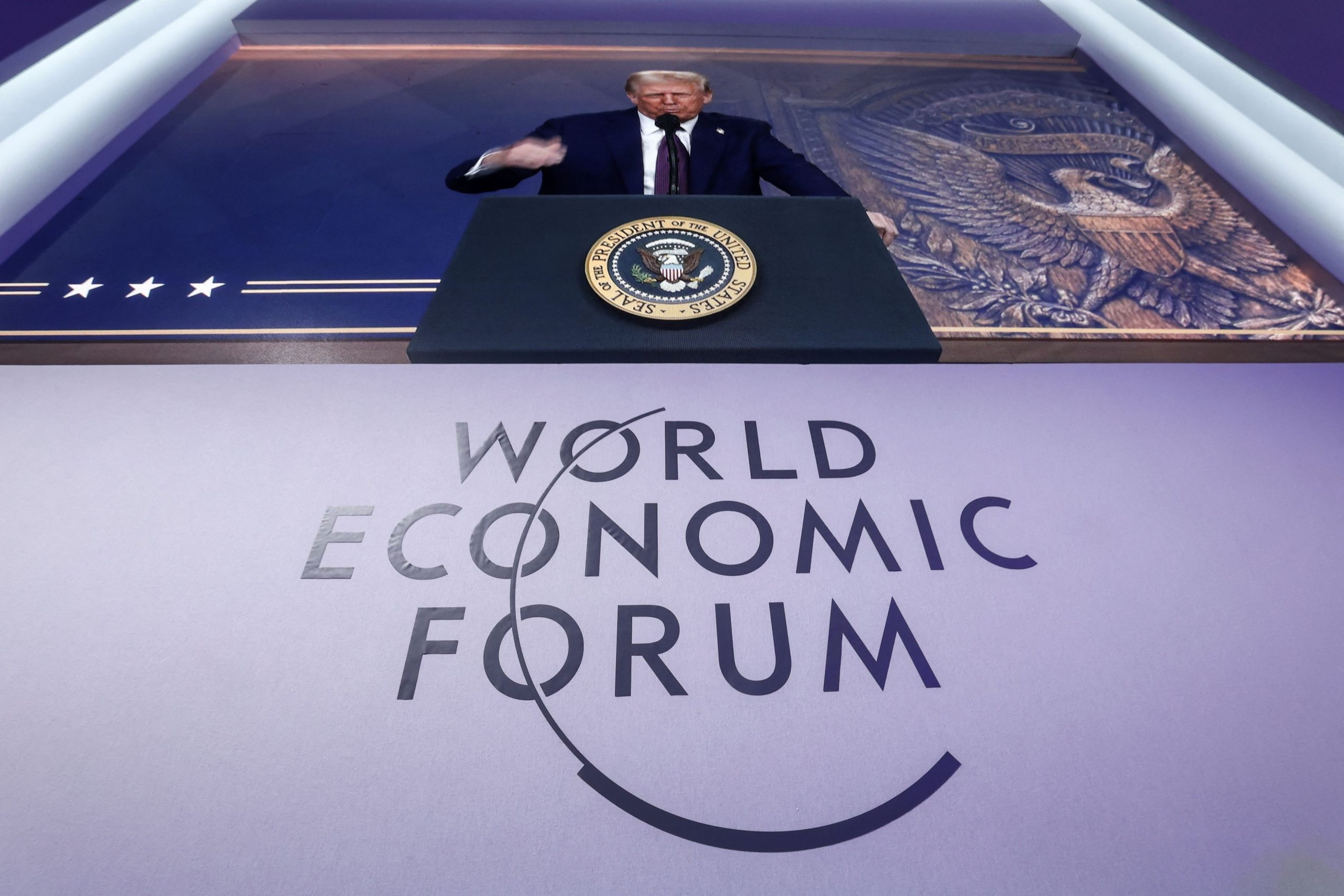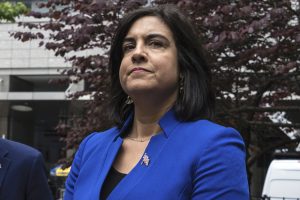DAVOS, Switzerland—President Trump and his allies used the World Economic Forum to offer the global elite a warning: He intends to follow through on his “America First” campaign promises , spurning allies in the process if necessary.
“My message to every business in the world is very simple: Come make your product in America and we will give you among the lowest taxes of any nation on Earth,” Trump said in a video address from Washington on Thursday, revealing he didn’t attend in person because of his inauguration earlier this week . “But if you don’t make your product in America, which is your prerogative, then, very simply, you will have to pay a tariff.”
Expressing frustration at tariffs the European Union places on American farm products and cars, Trump said the bloc treats the U.S. unfairly. “They put tariffs on things that we want to do.”
His remarks offered a protectionist shot across the bow to U.S. allies and companies that hoped being friendly with the U.S. would mean fewer penalties on their goods.
Trump also sought to take a firmer grip on global affairs, calling on the Saudi Arabia-led Organization of the Petroleum Exporting Countries to lower the price of oil . He suggested such a move could put pressure on Russia to call off its invasion of Ukraine, given much of the Kremlin’s revenue comes from energy sales.
“The price is high enough that that war will continue,” Trump said. “You got to bring down the oil price. You could end that war.”
Trump added of the oil consortium: “They’re very responsible, actually, to a certain extent, for what’s taking place” in Ukraine.
The Saudi government didn’t immediately respond to a request for comment.
Trump is eager to start swift negotiations to end the war between Ukraine and Russia, reiterating in his Davos address a desire to meet soon with Russian President Vladimir Putin in an effort to quell the fighting. In a Wednesday social-media post, the president urged Putin to sit down for talks and strike a deal. If not, he warned, “I have no other choice but to put high levels of Taxes, Tariffs, and Sanctions on anything being sold by Russia to the United States, and various other participating countries.”
Trump’s drive toward immediate negotiations has rankled European leaders, particularly those from the east and near Ukraine. They say now isn’t the time for talks because Putin has no intention of withdrawing troops after nearly three years of war and hundreds of thousands of casualties. A more preferable course, they recommend, is providing Ukraine with more weapons and economic aid to reverse trends on the battlefield, giving it more leverage by effectively forcing Putin to talk.

U.S. President Donald Trump makes a special address remotely during the 55th annual World Economic Forum (WEF) meeting in Davos, Switzerland, January 23, 2025. REUTERS/Yves Herman
“I want Vladimir Putin to beg us, Ukraine and allies of Ukraine, to sit at the table,” Polish President Andrzej Duda said earlier Thursday at a pro-Kyiv breakfast on the sidelines of the conference.
At that event, Trump’s allies beamed in via videoconference to chide European leaders for their handling of the war in Ukraine, with one top administration official warning that efforts to fold the country into the North Atlantic Treaty Organization during peace talks with Russia would run into an American “buzz saw.”
For days in this snowy ski town, allied officials were bewildered at Trump’s continuous threats to impose tariffs on friendly nations , seize other countries’ territories , and force Ukraine into peace talks with Russia. Some of America’s closest counterparts in the Swiss Alps repeatedly expressed their hopes for freer trade and stronger pushback against Putin, not so subtly rebuking Trump’s opening foreign-policy gambits.
But there was also a realization that Trump is stronger at home and abroad than he was at the start of his first term, making it likely that he will find more success in his pursuit of an unvarnished “America First” agenda.
“Under the last administration, our nation has suffered greatly, but we’re going to bring it back and make it greater, bigger, stronger, better than ever before,” Trump told the Davos audience.
While European officials said the first term provided a blueprint for dealing with Trump, it is already clear that their wounds from that era never healed. And as a newly Republican-controlled Washington holds firm, there is a good chance those wounds could reopen in the months ahead.
The war in Ukraine isn’t lost, European officials insist, even though Russian troops have the manpower and equipment advantage while Moscow skirts Western-imposed sanctions. The quickest way to ensure Ukraine falters, and that parts of its territory become part of Russia, is by ending the conflict prematurely, they say.
“We need to end the war, but to end the war in a way which ensures that we don’t lose the war,” Jens Stoltenberg , until last year NATO’s secretary-general, said in an interview. “To get that deal, we need leverage, and if we stop supporting Ukraine, we will not have any leverage.”
Once peace talks begin in earnest, Mark Rutte , Stoltenberg’s successor, told the breakfast audience that the bloc should ensure Russia never attacks Ukraine again, guaranteed by the invaded nation’s entry into the alliance.
But Richard Grenell , Trump’s envoy for special missions, shortly afterward appeared on screen to slam the former Dutch prime minister’s stance because some allies don’t spend the requisite 2% of gross domestic product on their own defense.
“I think you’re going to run into a big buzz saw in America if we have the NATO secretary-general talking about adding Ukraine to NATO,” Grenell said. “You cannot ask the American people to expand the umbrella of NATO when the current members aren’t paying their fair share—and that includes the Dutch, who need to step up.”
Vitali Klitschko , the mayor of Ukraine’s capital Kyiv, said in an interview that he left the session feeling that his country was unlikely to become NATO’s 33rd member soon. So, he said, Ukraine needed to work with allies to draft other options that might deter another Russian invasion.
Trump’s continued threat of new tariffs on European goods has further alarmed allies. He argues tariffs would right-size trade relations and bring in more revenue into the U.S., but officials here countered that the trans-Atlantic economy could take a plunge if Trump followed through with the duties.
“Tariffs against friends and allies is a crazy idea,” Finnish Foreign Minister Elina Valtonen said in an interview.
An argument Europeans repeat in front of Trump’s aides is that an economically weaker Europe complicates U.S. efforts to curb China’s military and technological advances as well as the global competition for semiconductor dominance.
In interviews here this week, European allies have questioned whether Trump, who wants to upend free trade and muses about taking territory from Denmark and Panama , will uphold what is known as the “liberal international order” ushered in by the U.S. after World War II.
But they concede they have few tools to counter the new president, save for imposing their own tariffs on the U.S. and arming Ukraine even if aid from Washington dries up.
“He’s the apex predator,” said Ian Bremmer , president of the Eurasia Group, a consulting firm. “It’s a very attractive position for Trump to be in, but it’s a very dangerous position for the rest of the world.”
Write to Alexander Ward at alex.ward@wsj.com



